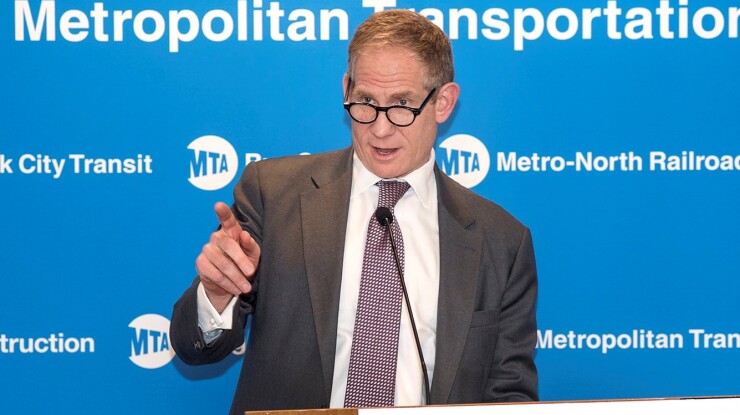
Metropolitan Transportation Authority CEO Janno Lieber was "ecstatic" about the news of a New York state budget deal.
The budget agreement, which Gov. Kathy Hochul announced earlier this week, would fill the
"This is a huge moment for the MTA," Lieber said at Wednesday's MTA board meeting. "What Albany has done is said, 'We're going to make a massive investment in New York.' And the investment's going to benefit the riders.'"
The new funding will come from an increase in the payroll mobility tax. Hochul
The payroll mobility tax was also a source of funding for the MTA's 2020-2024 capital plan. That tax was specifically imposed on businesses in New York City.
This time, the tax hike will cover a wider region. The increase will only affect larger employers, Hochul said; small businesses already paying the PMT will see their tax rate drop.
"I do support the core concept proposed
The MTA's $68 billion capital plan focuses mostly on "state of good repair" work, addressing the aging system's
"There's several projects that are kicking off right away now that we have this capital program in place," Lieber said. "I'm not waiting until the ink in Albany is dry. We're in go mode."
The MTA will have to issue $44 billion of bonds to fund the capital plan.
The MTA had always planned to cover $10 billion of the capital plan with bonds, which will be paid out of its operating budget. Another $3 billion of the funding will come from the Triborough Bridge and Tunnel Authority's bonds.
The MTA expects $14 billion of the plan to come from federal grants.
When the agency submitted the capital plan, it included a $33.4 billion budget gap for the state to fill as it pleased.
Hochul suggested in her news conference announcing the budget agreement that the MTA could use the $3 billion of savings to issue bonds, but Lieber said the agency will first attempt to achieve the $3 billion on a pay-as-you-go basis.
"We're very committed to maintaining the ratio that 15% of our operating budget is debt service," Lieber said. "There are lots of ways that we can accomplish the efficiencies that have been talked about. We're just getting started. So I don't want anyone to assume that we're going to be piling on the borrowing, because we're very committed to maintaining the right debt service ratio."
Lieber is confident that the MTA will be able to find the savings. For the 2020-2024 capital plan, Albany required the MTA's Construction and Development company to find $400 million of annual efficiencies, and the agency actually exceeded that goal by $100 million.
However, the Trump administration's
The agency may also have to weather attempts to
"We've heard some of the verbal threats, but I think those are going to be addressed through the legal process if it becomes necessary," Lieber said. "And we're very confident in that process."
The 2025-2029 plan was





